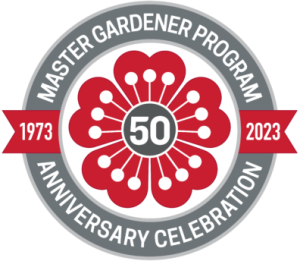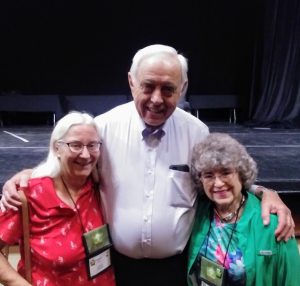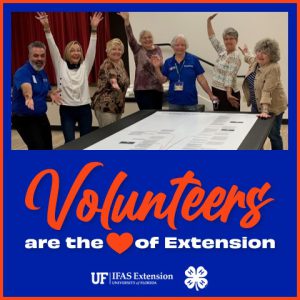This year, the Master Gardener Volunteer program celebrates its fiftieth year. Programs across the United States (and beyond) are recognizing the extraordinary accomplishments the program has made in so many communities. Additionally, March 20-26 is officially National Extension Master Gardener Volunteer week.
How did the Master Gardener Volunteer program start? How does it benefit the state and the local community?
The urban growth in many areas of the United States coupled with increased interest in the environment and home gardening have prompted ever-increasing numbers of resident questions to County Extension Service agents. Many of these questions are seasonal in nature and are relatively easily answered assuming that one has horticultural training. So, in 1972, an innovative Extension Agent (Dr. David Gibby) at Washington State University reasoned that well-trained volunteers could respond to many of the everyday residential questions freeing him and his colleagues for more technical and difficult issues. Volunteers, such as Extension Homemakers and 4-H Leaders had always been a part of the Extension Service, so it only made sense that Extension horticulture volunteers would work.

The Extension agent selected, trained, and certified volunteers as Master Gardeners. They soon succeeded in meeting his desired objectives – in fact they exceeded his expectations. This led to the genesis of the Master Gardener Volunteer Program.
Since that time, the Master Gardener Volunteer Program has grown and is now active in 45 states. Florida’s began in 1979. The Florida Master Gardener Volunteer Program is sponsored by the University of Florida’s Institute of Food and Agricultural Sciences (UF/IFAS) Extension Service. A very active program, in 2022, Florida’s Master Gardener Volunteer Program cited a membership of over 3,200 volunteers donating over 305,000 hours of volunteer service to local communities around the state. At a value of $27.68/hour, this means that over $8.5 million dollars of volunteer time was donated in Florida in 2022 alone!
These programs are local. The Master Gardener Volunteer Program in each county focuses on the local needs of the residents. From assisting with community and school gardens, home gardening queries, and water savings, Master Gardener Volunteer programs aim to help the community in a variety of ways. In Polk County, the Master Gardener Volunteer Program began in the late 1980s and has a huge success educating youth and adults alike. Each March, Master Gardener Volunteers teach Polk County fourth grade students about pollination and plants at Agrifest. This internationally award-winning curriculum reaches over 3,000 students each year! Additionally, Polk County Master Gardener Volunteers educate residents at workshops, webinars, in the Plant Clinic, and at local events. Through these programs, residents reported millions of gallons of water savings. This local program has won numerous international and national awards for innovative programming.
 Join UF/IFAS Extension Polk County in recognizing our amazing volunteers on our social media sites (@PolkGardening) all week, March 20-26. Share with us how a Master Gardener Volunteer has helped in your community. If you are interested in becoming a Master Gardener Volunteer in Polk County, applications are now open at https://bttr.im/fb719.
Join UF/IFAS Extension Polk County in recognizing our amazing volunteers on our social media sites (@PolkGardening) all week, March 20-26. Share with us how a Master Gardener Volunteer has helped in your community. If you are interested in becoming a Master Gardener Volunteer in Polk County, applications are now open at https://bttr.im/fb719.
For more information, contact UF/IFAS Extension Polk County at (863) 519-1041 or visit us online at http://sfyl.ifas.ufl.edu/polk. The Plant Clinic is open Monday-Friday, 9:00 am-4:00 pm to answer your gardening and landscaping questions. Give us a call or email us at polkmg@ifas.ufl.edu.
If you are not in Polk County, Contact your local UF/IFAS Extension Master Gardener Volunteer Plant Clinic.
The Florida Master Gardener Volunteer Program is a volunteer-driven program that benefits UF/IFAS Extension and the citizens of Florida. The program extends the vision of the University of Florida/Institute of Food and Agricultural Sciences, all the while protecting and sustaining natural resources and environmental systems, enhancing the development of human resources, and improving the quality of human life through the development of knowledge in agricultural, human and natural resources and making that knowledge accessible.
An Equal Opportunity Institution.
 2
2
